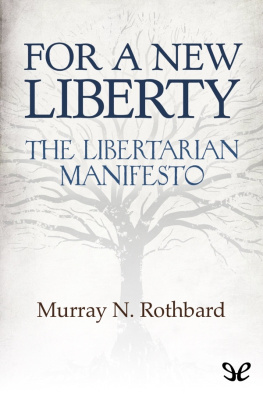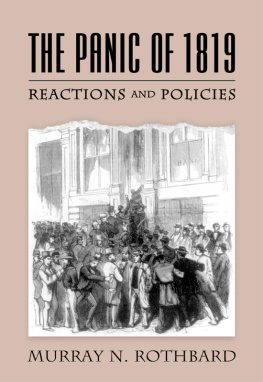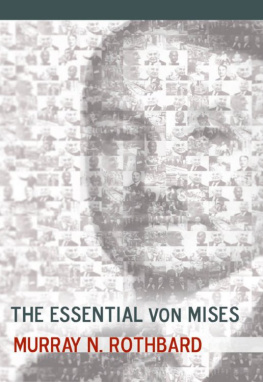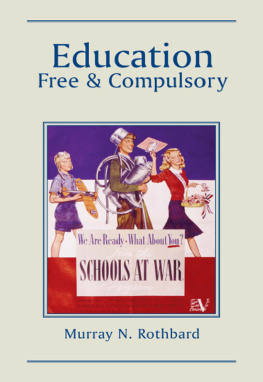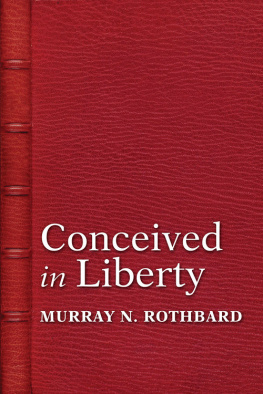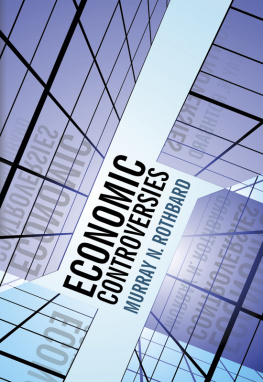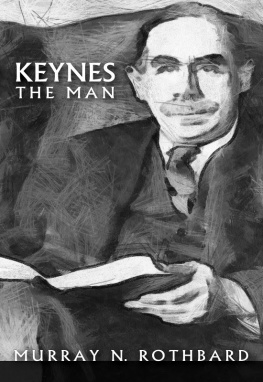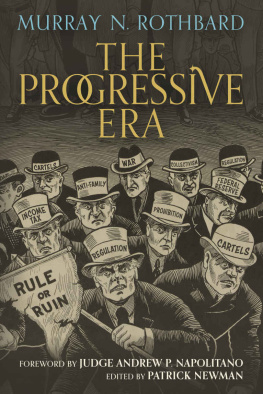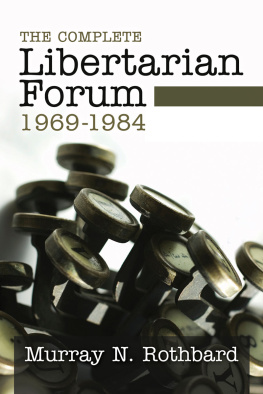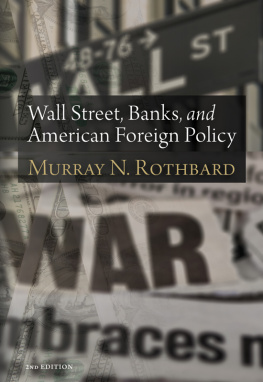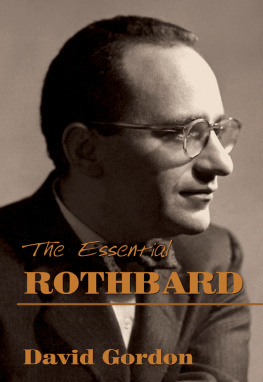Murray N. Rothbard - For a New Liberty
Here you can read online Murray N. Rothbard - For a New Liberty full text of the book (entire story) in english for free. Download pdf and epub, get meaning, cover and reviews about this ebook. year: 1973, publisher: ePubLibre, genre: Politics. Description of the work, (preface) as well as reviews are available. Best literature library LitArk.com created for fans of good reading and offers a wide selection of genres:
Romance novel
Science fiction
Adventure
Detective
Science
History
Home and family
Prose
Art
Politics
Computer
Non-fiction
Religion
Business
Children
Humor
Choose a favorite category and find really read worthwhile books. Enjoy immersion in the world of imagination, feel the emotions of the characters or learn something new for yourself, make an fascinating discovery.
- Book:For a New Liberty
- Author:
- Publisher:ePubLibre
- Genre:
- Year:1973
- Rating:5 / 5
- Favourites:Add to favourites
- Your mark:
- 100
- 1
- 2
- 3
- 4
- 5
For a New Liberty: summary, description and annotation
We offer to read an annotation, description, summary or preface (depends on what the author of the book "For a New Liberty" wrote himself). If you haven't found the necessary information about the book — write in the comments, we will try to find it.
For a New Liberty — read online for free the complete book (whole text) full work
Below is the text of the book, divided by pages. System saving the place of the last page read, allows you to conveniently read the book "For a New Liberty" online for free, without having to search again every time where you left off. Put a bookmark, and you can go to the page where you finished reading at any time.
Font size:
Interval:
Bookmark:

In For a New Liberty: The Libertarian Manifesto, Rothbard proposes a once-and-for-all escape from the two major political parties, the ideologies they embrace, and their central plans for using state power against people. Libertarianism is Rothbard's radical alternative that says state power is unworkable and immoral and ought to be curbed and finally abolished.

Murray Newton Rothbard
The Libertarian Manifesto
ePub r1.2
Titivillus 15.03.16
Ttulo original: For a New Liberty
Murray Newton Rothbard, 1973
Retoque de cubierta: Titivillus
Editor digital: Titivillus
Primer editor: loto (r1.0)
ePub base r1.2
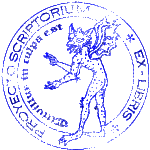
TO JOEY,
still the indispensable framework.
When the original edition of this book was published (1973), the new libertarian movement in America was in its infancy. In half a dozen years the movement has matured with amazing rapidity, and has expanded greatly both in quantity and quality. Hence, while the discussion of libertarianism in this book has been strengthened and updated throughout, the greatest change is in our treatment of the libertarian movement. The original chapter i, on "The New Libertarian Movement," is now irrelevant and outdated, and it has been transformed into an appendix providing an annotated outline of the complex structure of the current movement. The new chapter 1, on "The Libertarian Heritage," provides a brief but badly needed historical background of the American and Western tradition of liberty, and of its successes and failures, setting the stage for our discussion of its rebirth in today's movement. A new chapter 9 has been added on the vital topic of inflation and the business cycle, and the roles of government and of the free market in creating or alleviating these evils. Finally, to the concluding chapter on strategy has been added a presentation and explanation of my recently gained conviction that liberty will win, that liberty will be making great strides immediately as well as in the long run, that, in short, liberty is an idea whose time has come.
I owe the origin and inspiration of this book to my first editor, Tom Mandel, who had the vision to anticipate the recent enormous growth [p. x] of interest in libertarianism. The book would neither have been conceived nor written without him. For the revised edition, Roy A. Childs, Jr., editor of Libertarian Review, was extremely helpful in suggesting needed changes. I would also like to thank Dominic T. Armentano, of the economics department of the University of Hartford, Williamson M. Evers, editor of Inquiry, and Leonard P. Liggio, editor of The Literature of Liberty, for their welcome suggestions. Walter C. Mickleburgh's unbounded enthusiasm for this book was vitally important in preparing the revised edition; and Edward H. Crane HI, president of Cato Institute, San Francisco, was indispensable in providing help, encouragement, sound advice, and suggestions for improvement.
MURRAY N. ROTHBARD
Palo Alto, California
February 1978
THE LIBERTARIAN HERITAGE : THE AMERICAN REVOLUTION AND CLASSICAL LIBERALISM
O n Election Day, 1976, the Libertarian party presidential ticket of Roger L. MacBride for President and David P. Bergland for Vice President amassed 174,000 votes in thirty-two states throughout the country. The sober Congressional Quarterly was moved to classify the fledgling Libertarian party as the third major political party in America. The remarkable growth rate of this new party may be seen in the fact that it only began in 1971 with a handful of members gathered in a Colorado living room. The following year it fielded a presidential ticket which managed to get on the ballot in two states. And now it is Americas third major party.
Even more remarkably, the Libertarian party achieved this growth while consistently adhering to a new ideological creedlibertarianismthus bringing to the American political scene for the first time in a century a party interested in principle rather than in merely gaining jobs and money at the public trough. We have been told countless times by pundits and political scientists that the genius of America and of our party system is its lack of ideology and its pragmatism (a kind word for focusing solely on grabbing money and jobs from the hapless taxpayers). How, then, explain the amazing growth of a new party which is frankly and eagerly devoted to ideology?
One explanation is that Americans were not always pragmatic and nonideological. On the contrary, historians now realize that the American Revolution itself was not only ideological but also the result of devotion to the creed and the institutions of libertarianism. The American revolutionaries were steeped in the creed of libertarianism, an ideology which led them to resist with their lives, their fortunes, and their sacred honor the invasions of their rights and liberties committed by the imperial British government. Historians have long debated the precise causes of the American Revolution: Were they constitutional, economic, political, or ideological? We now realize that, being libertarians, the revolutionaries saw no conflict between moral and political rights on the one hand and economic freedom on the other. On the contrary, they perceived civil and moral liberty, political independence, and the freedom to trade and produce as all part of one unblemished system, what Adam Smith was to call, in the same year that the Declaration of Independence was written, the obvious and simple system of natural liberty.
The libertarian creed emerged from the classical liberal movements of the seventeenth and eighteenth centuries in the Western world, specifically, from the English Revolution of the seventeenth century. This radical libertarian movement, even though only partially successful in its birthplace, Great Britain, was still able to usher in the Industrial Revolution, thereby freeing industry and production from the strangling restrictions of State control and urban government-supported guilds. For the classical liberal movement was, throughout the Western world, a mighty libertarian revolution against what we might call the Old Orderthe ancien rgime which had dominated its subjects for centuries. This regime had, in the early modern period beginning in the sixteenth century, imposed an absolute central State and a king ruling by divine right on top of an older, restrictive web of feudal land monopolies and urban guild controls and restrictions. The result was a Europe stagnating under a crippling web of controls, taxes, and monopoly privileges to produce and sell conferred by central (and local) governments upon their favorite producers. This alliance of the new bureaucratic, war-making central State with privileged merchantsan alliance to be called mercantilism by later historiansand with a class of ruling feudal landlords constituted the Old Order against which the new movement of classical liberals and radicals arose and rebelled in the seventeenth and eighteenth centuries.
The object of the classical liberals was to bring about individual liberty in all of its interrelated aspects. In the economy, taxes were to be drastically reduced, controls and regulations eliminated, and human energy, enterprise, and markets set free to create and produce in exchanges that would benefit everyone and the mass of consumers. Entrepreneurs were to be free at last to compete, to develop, to create. The shackles of control were to be lifted from land, labor, and capital alike. Personal freedom and civil liberty were to be guaranteed against the depredations and tyranny of the king or his minions. Religion, the source of bloody wars for centuries when sects were battling for control of the State, was to be set free from State imposition or interference, so that all religionsor nonreligionscould coexist in peace. Peace, too, was the foreign policy credo of the new classical liberals; the age-old regime of imperial and State aggrandizement for power and pelf was to be replaced by a foreign policy of peace and free trade with all nations. And since war was seen as engendered by standing armies and navies, by military power always seeking expansion, these military establishments were to be replaced by voluntary local militia, by citizen-civilians who would only wish to fight in defense of their own particular homes and neighborhoods.
Font size:
Interval:
Bookmark:
Similar books «For a New Liberty»
Look at similar books to For a New Liberty. We have selected literature similar in name and meaning in the hope of providing readers with more options to find new, interesting, not yet read works.
Discussion, reviews of the book For a New Liberty and just readers' own opinions. Leave your comments, write what you think about the work, its meaning or the main characters. Specify what exactly you liked and what you didn't like, and why you think so.

